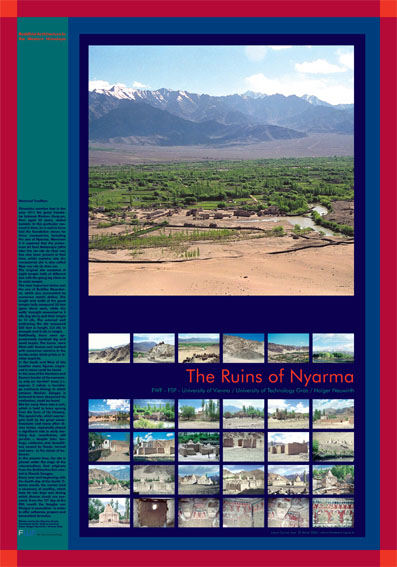
Chronicles mention that in the year 1011 the great translator
Lotsawa Rinchen Zang-po, then aged 55 years, visited Ladakh.
In this particular moment in time, he is said to have laid the
foundation stones for three monasteries, including the one of
Nyar ma.
Moreover it is reported that the protectress Sri Devi
Mahavajra (dPal ldan lha mo rdo rje chen mo) has also been present
at that time, which explains why the monasterial site is also
called Nyar ma rdo rje chen mo.
The
original site consisted of eight temple halls of different size
with the
gtsug lag khan as
its main temple. The most important
statue was the one of Buddha Dipamkara, which was surrounded
by numerous tantric deities. The length and width of the
great temple halls measured 25 feet (gom khru) each, while
the walls’ strength
amounted to 3 ells (lag khru) and their height to 13 ells.
The external wall embracing the site measured 250 feet in
length, 2.5 ells in strength and 8 ells in height. Additinally,
there
were approximately hundred big and small stupas. The Caren
were
filled with Tsatsas and marked with numerous mantras in the
Lantsa script, block prints or similar imprints. In the South
and West
of this location many figures engraved in stone could be
found.In
the area of the Northern and Eastern border of the monastery,
only an ‘earshot’ away (i.e.
approx. 2 miles), a hermitage (mtshams khang) in which Lotsawa
Rinchen Zangpo is believed to have deepened his realisation,
could be found. Not far away there was a well, which is held
to have sprung from the force of his blessing. This special
site, which was largely built by the great Lama-translator and
many
other divine lamas, repeatedly played a significant role in
early teaching but, nonetheless, still persists – despite
later lootings, robberies and demolitions caused by floods,
turmoil and wars - in the minds of believers.
Text: Nyarma Society/ Translation from Tibetan: Dr. Andrea Loseries